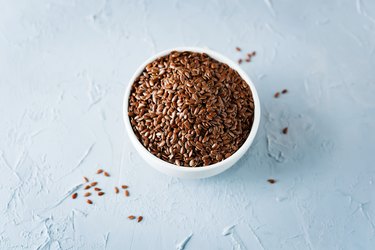
Whether you eat them raw, toasted, baked, ground or any other way, flax seeds provide a host of powerful nutritional benefits. Add them to your smoothie, cereal, yogurt or baked goods for some added fiber and healthy fats.
Raw flax seeds do contain traces of cadmium and cyanide, which can cause stomach upset for some people. Find out more about the nutrition breakdown of flax seeds by using a calorie counter.
Video of the Day
Video of the Day
Tip
Flax seeds — a good source of fiber and healthy fats — can be eaten in various forms, including toasted, baked and ground. Consuming them raw is generally safe, but can lead to stomach upset for some people.
Read more: Bad Side Effects of Flaxseed
Benefits of Flax Seeds
In addition to being a strong source of essential fatty acids, otherwise known as omega-3s, flax seeds are high in fiber and lignans, phytochemicals that may boost the immune system and cut risks of disease. The National Center for Complementary and Integrative Health reports that flax seeds may improve digestive health, reduce inflammation, help lower your cholesterol level and reduce the risk of heart disease, but more research is needed to confirm these benefits.
Eating them ground up can enhance the health benefits of flax seeds. According to Mayo Clinic, whole flax seeds can pass through your digestive system undigested, meaning you miss out on its nutritional benefits. Ground flax seed is digested much more easily.
Flax Seed Nutrition Facts
The United States Department of Agriculture doesn't point out any nutritional differences between raw and toasted or baked flax seeds. A tablespoon of ground seeds has 37 calories, 1 gram of protein, 3 grams of fat, 2 grams of carbohydrates, 2 grams of fiber, trace amounts of sugar, 2 grams of sodium and no cholesterol, according to the USDA. Its relatively high fiber content and low calorie count make raw, ground flax seed a smart choice for weight loss plans, since fiber is one nutrient that can help you feel satisfied and stay full for a long time.
You must eat flax seeds ground to most effectively absorb their omega-3 fatty acids and other primary nutrients. However, it's typically fine to eat the seeds raw. After buying raw seeds, grind small amounts in a coffee grinder, in a spice grinder or with a mortar and pestle before you eat them. The high amounts of oil in raw flax mean that the seeds can go rancid, especially after they're ground, so it's helpful to store them in the fridge. Sprinkle raw, ground flax seeds on cereal or granola, bake them into cookies and bars, or eat them as a salad topping.
Read more: Golden Flax Seed Vs. Brown Flax Seed
Consider the Toxins
According to a September 2014 article published by _Journal of Food Science and Technology, f_lax seed does contain cyanogenic glycosides and linamarin, which are plant toxins. The article points out that the processing of flax seeds reduces potential risks associated with poisoning. Heating the seeds also removes most of these toxins. However, the article also points out that that toxin levels in flax seed are less than those in smoking tobacco.
The National Center for Complementary and Integrative Health also advises that flax seed should not be consumed raw due to the possibility of it containing toxins.
- Mayo Clinic: "Does Ground Flaxseed Have More Health Benefits Than Whole Flaxseed?"
- USDA National Nutrient Database: "Seeds, Flaxseed"
- National Center for Complementary and Integrative Health: "Flaxseed ad Flaxseed Oil"
- Journal of Food Science and Technology: "Flax and Flaxseed Oil: An Ancient Medicine & Modern Functional Food"